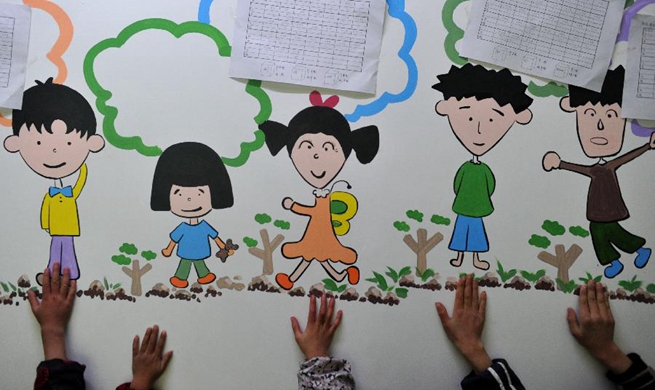by Nick Kolyohin
JERUSALEM, Nov. 30 (Xinhua) -- Artificial intelligence (AI) would have a crucial role in future medicine, according to healthcare industry leaders from around the globe who gathered at a medical conference recently held in the Israeli city of Tel Aviv.
"We are at a unique point in time," said Elena Bonfiglioli, senior director for Microsoft's health and life sciences in Europe, Africa, and the Middle East.
Bonfiglioli was one of around 1,500 participants at the conference titled "Digital Health Now," one of the biggest digital health conferences in Israel. AI was among the most spoken words at the conference.
Among the participants were over 60 health organizations, alongside 350 technology companies, startups, and senior managers of global companies from Israel and around the world.
International attendees of the event looked primarily for Israel's cutting-edge technology and also for cooperation with local healthcare institutions.
The organizer of the conference was HealthIL, a digital health innovation community, which is a joint venture of the Israel Innovation Institute, and the Israeli ministries of economy and social equality.
Israel has recognized the digital transformation in the health system as a key field where the country could and should lead on the world stage.
With healthcare providers and patients accumulating massive quantities of information in the new age of monitoring everything, the data could be used for creating much better medicines with the help of AI in analyzing them.
As in many other fields of high tech, Israel combined the abilities of its academia, private, government, army, and public institutions to create collaboration for greater results.
Bonfiglioli told Xinhua that "digitization of health records become pervasive. Therefore, we can work with new tools, notably cloud and artificial intelligence."
With the new immense amounts of medical data collected on patients by healthcare systems around the world, the researchers could have a much better understanding of the human body.
Mass data enables, according to Bonfiglioli, "a deeper unprecedented view of the determinants of human health, which is going to lead us to new insights in terms of precision medicine and prevention."
"Data is all together, the promise, the opportunity, and also the challenge of future medicine. It is in our ability to leverage data in an enhanced secure and private way," said Bonfiglioli.
The new amount of data makes it possible to have entirely novel insight into what should be the best treatment for each individual, in accordance with unique personal health information.
It is a new opportunity in healthcare "to understand the response of the immune system, detect conditions early, and to be able to do an earlier intervention," Bonfiglioli said.
One of the most significant benefits for the patients will be the transformation of healthcare for precision medicine and the opportunity to do personalized care for each patient.
The innovation of technology would help with the growing burnout of clinicians, said Bonfiglioli. AI could help doctors do daily repeating desk tasks.
There is going to be a shortage of 14 million clinicians in the next decade over the world, according to Bonfiglioli. Releasing doctors of the desk work would give them more time to do critical medical procedures their patients in urgent need.
"One of the greatest developments in medical technology is virtual reality," said Bonfiglioli. New helmets for doctors show them 3D online imaging of patients' bodies and organs.
"We see a future of the augmented partnership between machines and clinicians, where artificial intelligence is there to support the decision of the clinicians," Bonfiglioli said.
CEO of HealthIL Yael Ophir told Xinhua that "our community of HealthIL has over 600 startups, tech companies, and health organizations."
"We connect the needs of health organizations and challenges, with startups that having the solutions. AI will change the world of healthcare, and it will probably take a few years," said Ophir.
"AI won't replace the doctor, but the role of the doctor will change dramatically," said Ophir, noting that some AI applications could have the power of tens of thousands of doctors.
Startups that are part of the HealthIL community have showcased at the conference's exhibition how they could tackle the current challenges of medicine with innovative solutions.
For example, Selfit startup has developed a unique robot designed to aid and facilitate the rehabilitation process of a variety of conditions digitally, at home or the clinic.
The augmented reality-based system of Selfit makes advanced use of big data technology and AI to analyze the recovery process, personalize it, and keep track of the patients' progress.
Right Hear is a startup that has developed an audio-based accurate navigational system in a variety of public areas, indoors and outdoors, designed for the visually impaired and blind.
Nikolaj Gurdala, regional manager at the European Institute of Innovation and Technology (EIT) Health, European Union, one of the co-partners of the convention, told Xinhua that his institute is searching for new technology startups, governments, public payers, and individual investors to work in its projects as well as with European hospitals.
"We strongly believe in prevention. We try to encourage people to live actively to live healthier, not to be patients," said Gurdala.
Jonathan Machado, investment director at Samsung Next, came to the conference to look for new cutting-edge technology providers to invest in and collaborate with.
Machado said that data is a promising tool for future AI innovative medicine, still the industry must care more for the privacy and security of sensitive personal information.

















